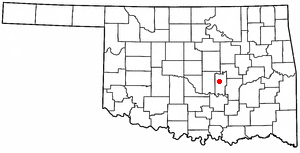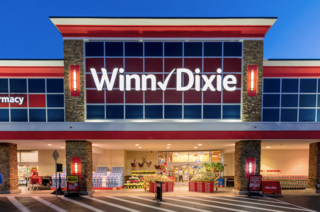
Seminole is a city in Seminole County, Oklahoma, United States. The population was 7,488 at the 2010 census. Seminole experienced a large population growth in the 1920s due to an oil boom.

Wewoka is a city in Seminole County, Oklahoma, United States. The population was 3,271 at the 2020 census. It is the county seat of Seminole County.

Penney OpCo LLC, doing business as JCPenney and often abbreviated JCP, is an American department store chain that operates 656 stores across 49 U.S. states and Puerto Rico. Departments inside JCPenney stores include Men's, Women's, Boys', Girls', Baby, Bedding, Home, Fine Jewelry, Shoes, Lingerie, JCPenney Salon, JCPenney Beauty, as well as leased departments such as Seattle's Best Coffee, US Vision optical centers, and Lifetouch portrait studios.

Winn-Dixie Stores, Inc., styled as Winn✓Dixie, is an American supermarket chain headquartered in Jacksonville, Florida. It operates more than 546 stores in Louisiana, Mississippi, Alabama, Georgia, and Florida. The company has had its present name since 1955 and can trace its roots back to 1925.

Eckerd Corporation was an American pharmacy retail chain that was headquartered in Largo, Florida, and toward the end of its life, in Warwick, Rhode Island. At its peak, Eckerd was the second-largest pharmacy chain in the United States, with approximately 2,802 stores in 23 states as far west as Arizona.

James Cash Penney Jr. was an American businessman and entrepreneur who founded the JCPenney stores in 1902.
Revco Discount Drug Stores, once based in Twinsburg, Ohio, was a major drug store chain operating through the Ohio Valley, the Mid-Atlantic states, and the Southeastern United States. The chain's stock was traded on the New York Stock Exchange under the ticker symbol RXR. Revco was sold to CVS Pharmacy for $2.8 billion in February 1997. When it was sold, the chain had over 2,500 stores.

The Penn Traffic Company was a food service company founded in 1854 in Johnstown, Pennsylvania.

Sweetbay Supermarket was a chain of American supermarkets located in Florida. The first Sweetbay Supermarket to open was in Seminole, Florida, in November 2004. The company's headquarters was located near Tampa, in Hillsborough County, Florida. It was a part of the Belgian Delhaize Group. In May 2013, the chain was purchased by BI-LO. On October 8, 2013, BI-LO announced it was retiring the Sweetbay name and all remaining locations would be re-branded as Winn-Dixie.

Stage Stores was a department store company specializing in retailing off-price brand name apparel, accessories, cosmetics, footwear, and housewares throughout the United States. Stores were usually located in shopping malls and centers or in standalone locations. The corporate office was located in Houston, Texas.

Ron Johnson is the CEO and founder of Enjoy Technology. Previously, he was CEO of JCPenney, where he led a failed effort to fundamentally reshape the retailer; senior vice president of retail operations at Apple Inc., where he developed the concept of the Apple Retail Stores and the Genius Bar; and the vice president of merchandising for Target Corporation, where he was credited for making the store appeal to a younger and trendier crowd. Johnson is on the Board of Directors of Globality Inc, a start-up based in Menlo Park, California.

Fay's Drug was a chain of drug stores that was founded in 1958 in Fairmount, New York. At its height, Fay's Drugs operated its core business, along with Wheels Discount Auto and The Paper Cutter Books and Office and Party Supply.

BI-LO was an American supermarket chain owned by Southeastern Grocers, headquartered in Jacksonville, Florida. At the time of the banner’s elimination, supermarkets under the BI-LO brand were operated in Georgia, South Carolina, and North Carolina.
Robert Anthony is a Republican politician from the U.S. state of Oklahoma. Anthony is serving his sixth consecutive six-year term on the Oklahoma Corporation Commission, where he has served since 1989. He was an unsuccessful candidate for the United States Senate in 2004, and unsuccessful candidate for United States Congress running against Glenn English in 1990. Anthony is term-limited in 2024.
Rudolph Hargrave served as a justice of the Oklahoma Supreme Court from 1978 until his retirement on December 31, 2010. Before being elevated to the highest court, he was a superior court and district judge for Seminole County from 1969 to 1978.

Penn Square Mall is a two-story, 1,083,937 sq ft (100,701 m2) regional shopping mall in Oklahoma City, Oklahoma, United States. It is located at the intersection of Pennsylvania Avenue and NW Expressway, near Interstate 44. The mall's anchor stores consist of JCPenney, Macy's, AMC Theatres, and two separate Dillard's stores. Simon Property Group, who manages the mall, owns 94.5% of it. In 2018, the mall generated sales of over $700 per square foot.
Harold's Stores, Inc. was a Norman, Oklahoma- and later Dallas-based chain of traditional, high-end classic styled ladies and men's specialty apparel stores. The chain operated 43 stores in 19 southern, western, and mid-western states in the United States. Prior to its bankruptcy filing, the company employed 624 people. The company was granted bankruptcy liquidation on November 10, 2008.

Southeastern Grocers is an American supermarket portfolio headquartered in Jacksonville, Florida. The portfolio was created by Lone Star Funds in September 2013 as the new parent company for Harveys, Winn-Dixie, and Fresco y Más.
The Seminole Producer is a daily newspaper circulated throughout Seminole County, Oklahoma. Founded in 1927 by James T. Jackson and Sadie Jackson, it is the only daily newspaper in Seminole County, and the largest newspaper within an 18-mile radius of Seminole, Oklahoma. The paper currently has a circulation of 5,400.

Shepherd Mall is a former shopping mall located in Oklahoma City, Oklahoma that opened in 1964 as the first fully-enclosed indoor shopping mall in Oklahoma City; however, by 2003 all of the anchors had closed and the mall was well underway in transitioning to being primarily an office complex.













